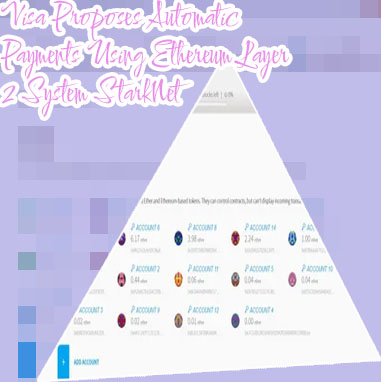
Ether address
Decentralized finance (DeFi) has become a hot topic in the world of cryptocurrency, with Ethereum leading the way as the platform of choice for many DeFi projects. As more people look to get involved in DeFi on Ethereum, it's important to understand how it all works. To help you navigate this complex and exciting world, we've put together a list of 4 articles that will provide you with valuable insights on how Ethereum DeFi operates and how you can make the most of it.
The Ultimate Guide to Ethereum DeFi: What You Need to Know

Ethereum DeFi, or decentralized finance, has been making waves in the world of cryptocurrency and finance in recent years. For those looking to understand this emerging trend, "The Ultimate Guide to Ethereum DeFi: What You Need to Know" is an invaluable resource.
The book provides a comprehensive overview of the Ethereum blockchain and how it is revolutionizing traditional financial systems. From decentralized exchanges to lending platforms, readers will gain a deep understanding of the various DeFi applications available on Ethereum.
One of the key takeaways from the guide is the emphasis on security and risk management in the world of DeFi. As decentralized finance continues to grow, it is crucial for investors to understand the potential risks and how to protect their assets.
Overall, "The Ultimate Guide to Ethereum DeFi: What You Need to Know" is a must-read for anyone interested in the future of finance. Whether you are a seasoned investor or new to the world of cryptocurrency, this book provides valuable insights and practical advice for navigating the world of Ethereum DeFi.
This topic is important and necessary for anyone looking to stay informed about the latest trends in finance and cryptocurrency. From investors to financial professionals, understanding Ethereum DeFi is essential for staying ahead in the rapidly evolving world of decentralized finance.
Exploring the Top DeFi Projects on Ethereum and How They Work
Decentralized Finance, or DeFi, has been gaining significant traction in the world of cryptocurrency and blockchain technology. One of the most popular platforms for DeFi projects is Ethereum, known for its smart contract capabilities and decentralized applications. In this article, we will explore some of the top DeFi projects on Ethereum and how they work.
One of the most well-known DeFi projects on Ethereum is MakerDAO, which offers a decentralized stablecoin called DAI. DAI is pegged to the US dollar and is backed by collateral assets, allowing users to borrow and lend funds without the need for a central authority. Another notable project is Uniswap, a decentralized exchange that allows users to swap various ERC-20 tokens directly from their wallets.
Compound is another DeFi project on Ethereum that enables users to earn interest on their cryptocurrency holdings by lending them out to borrowers. Users can also borrow assets by providing collateral in the form of other cryptocurrencies. Aave is a similar platform that offers lending and borrowing services, with the added feature of flash loans that allow users to borrow funds without any collateral.
Overall, these top DeFi projects on Ethereum are revolutionizing the way we think about traditional finance by providing decentralized and permissionless alternatives. With the growth of DeFi, we can expect
Understanding the Risks and Rewards of Participating in Ethereum DeFi
Ethereum's decentralized finance (DeFi) ecosystem has gained significant traction in recent years, offering users the opportunity to engage in a wide range of financial activities without the need for intermediaries. While the potential rewards of participating in DeFi can be enticing, it is crucial for users to understand the associated risks before diving in.
One key risk of participating in Ethereum DeFi is smart contract vulnerabilities, which can result in the loss of funds. Smart contracts, which are self-executing contracts with the terms of the agreement directly written into code, are at the core of many DeFi applications. However, if these contracts have bugs or are not properly audited, they can be exploited by malicious actors.
On the other hand, the rewards of participating in Ethereum DeFi can be substantial. For example, by providing liquidity to a decentralized exchange (DEX) such as Uniswap, users can earn trading fees and potentially receive additional rewards in the form of governance tokens. This can result in passive income streams and overall growth of one's cryptocurrency portfolio.
In conclusion, while participating in Ethereum DeFi can be lucrative, it is essential for users to conduct thorough research, understand the risks involved, and only invest what they can afford to lose. By staying informed and being cautious, users
Tips for Getting Started with Ethereum DeFi: A Beginner's Guide
Ethereum DeFi has been gaining significant traction in the world of cryptocurrency, offering users a decentralized financial ecosystem that allows for peer-to-peer transactions without the need for traditional financial intermediaries. For beginners looking to dip their toes into the world of Ethereum DeFi, there are several important tips to keep in mind.
First and foremost, it is crucial to understand the basics of Ethereum and how it differs from other cryptocurrencies such as Bitcoin. Ethereum is a decentralized platform that enables developers to build and deploy smart contracts, which are self-executing contracts with the terms of the agreement directly written into code. This technology is what powers the various decentralized finance applications built on the Ethereum blockchain.
One of the key things to consider when getting started with Ethereum DeFi is choosing a secure and reliable wallet to store your cryptocurrency. There are several options available, including hardware wallets, software wallets, and mobile wallets. It is important to do thorough research and choose a wallet that offers strong security features to protect your assets.
Another important tip for beginners is to start small and do your research before diving into any DeFi project. There are many different DeFi platforms and protocols available, each with its own unique features and risks. It is important to carefully read the project's whitepaper, understand how it works